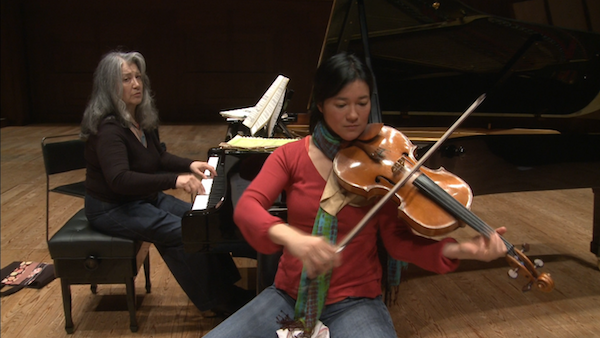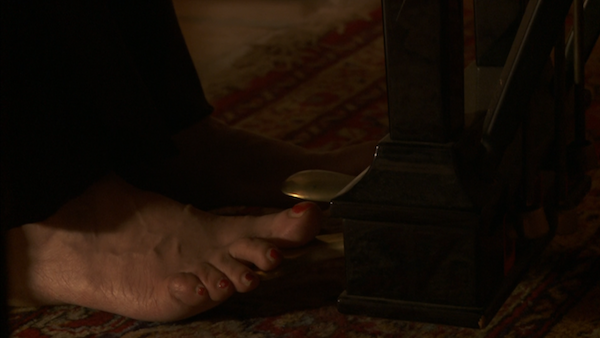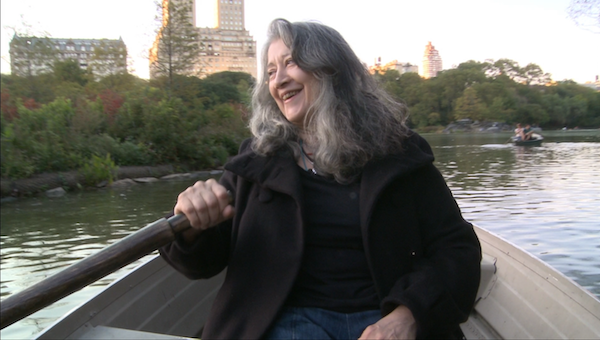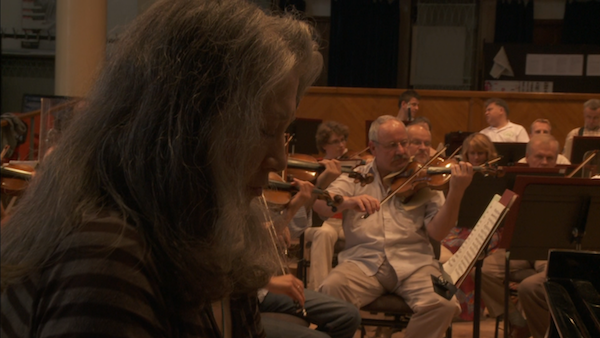| Reviews & Columns |
|
Reviews DVD TV on DVD Blu-ray 4K UHD International DVDs In Theaters Reviews by Studio Video Games Features Collector Series DVDs Easter Egg Database Interviews DVD Talk Radio Feature Articles Columns Anime Talk DVD Savant Horror DVDs The M.O.D. Squad Art House HD Talk Silent DVD
|
DVD Talk Forum |
|
|
| Resources |
|
DVD Price Search Customer Service #'s RCE Info Links |
|
Columns
|
|
|
Bloody Daughter

Stéphanie Argerich has been making videos of her mother, famed classical pianist Martha Argerich, since she was a little kid in the '80s. This habit might explain the ease Martha has with Stéphanie's camera in the new documentary Bloody Daughter. Granted, Martha will frequently comment on the act of being videotaped by her daughter and sometimes pointedly suggests that it's often better to live a moment than to record it, but there is a distinct unguarded quality in her interactions with her daughter. In a couple of instances, Stéphanie is seen onscreen, being captured by another cameraperson. One of them is the opening of the film, where Martha is there for the birth of Stéphanie's second child. It is a boy, although Martha had hoped for a daughter; maybe she is biased because she had three daughters herself.
While the main subject of the film is undoubtedly her mother, Stéphanie tries to create a portrait of their whole family. The title of the film, in fact, is a semi-joke pet name for Stéphanie from her father, Stephen Kovacevich, who is also a renowned classical pianist and was Martha's third husband. While Stéphanie's parents have long been divorced, they act like life-long chums when they get together. As much as she wants to re-integrate her father into her life, Stéphanie finds him consistently stubborn and perpetually a bit distant. In one sequence, she breaks down in front of him because he won't help her get the proper paperwork in order, so that he can be listed as her father on her birth certificate. (Instead, that designation continues to read "Father Unknown.")
Stéphanie also discusses her grandmother Juanita, whose eyes Stéphanie claims she never saw because her grandmother was embarassed by them and thought they made her look like "Mrs. Chiang Kai-Shek." In home video footage, her grandmother wears dark sunglasses and closes her eyes when she takes them off. Martha says that Juanita was never physically affectionate, and once was so puzzled as to how to express her love that she once tried to show it by kissing Martha on the kneecap.

The portrait Stéphanie paints of her own childhood does not lack that kind of maternal affection, but is nonetheless similarly odd and fraught with difficulties. Stéphanie lived with her older half-sister Anne in a kind of communal living situation that Martha had set up, with other musicians and artists living in the house and taking care of the kids while Martha was off performing on tour. Martha is described as having trouble acting like "the mother," and she would frequently ask the girls to fake sick from school so they could hang out like sisters. In an interview, Anne says that when they would rebel against their mother, it would ironically be in the form of demanding to go to school. It is revealed that Stéphanie also has an even older half-sister from Martha's first marriage, Lyda, who was not allowed to live with them for legal reasons. Stéphanie eventually unravels the key details of why her sister was kept from their family for so many years, but the revelations are handled in a fairly low-key fashion.
While inevitably there is a lot of pain touched upon, as often happens when looking back on a family history, Bloody Daughter is a quietly observed film. Apart from Stéphanie sobbing when she can't get her father to fix the birth certificate, there are no big shows of emotion. Instead, Bloody Daughter is more remarkable for its ability to capture unique candid moments, like Martha's sudden bouts of anxiety which arrive like clockwork minutes before every performance or a conversation between Martha and her three adult daughters on the practical difficulties of life while they paint each other's fingernails and toenails.
Bloody Daughter is naturally being marketed toward classical music buffs who know Argerich's work, but the film is much more interested in Argerich as a person than as an artist. It explores the impact family members can have on each other, which many viewers are going to recognize and relate to, whether their family looks like Martha Argerich's or not.

The Blu-ray
The Video:
Bloody Daughter was shot on high-def video, and it makes no attempt to look like anything but video. The AVC-encoded 1080i 1.77:1 image looks excellent, though. There is excellent detail, great color reproduction, and rich black levels. I spotted no compression issues. The handful of archive clips used in the film, despite the inconsistency of the formats with which they were shot, also seem to be in pretty good shape overall.
The Audio:
The documentary has dialogue variously spoken in English, French, and Spanish with Stéphanie narrating two possible versions: English narration DTS-HD MA 5.1 or LPCM 2.0 with forced English subtitles for the other languages, or French narration DTS-HD MA 5.1 or LPCM 2.0 with forced French subtitles for the other languages. There are also German, Spanish, and Polish subtitles. All of the tracks are quite good. Naturally, the older material has some defects, but the new stuff recorded specifically for this documentary sounds impeccable. The 5.1 tracks have a little more atmosphere, but they're not starkly different from the 2.0 versions, considering this is a documentary that was most likely recorded mostly with one mic.
Special Features:
- Martha Argerich in Warsaw, 27 August 2010 (1080i HD, 46:38) - A concert performance with Sinfonia Varsovia Orchestra of Chopin's Piano Concerto No. 1 in E minor, plus encores of Chopin's Mazurka in C Major Op. 24 No. 2 and Schumann's Traumeswirren Op. 12 No. 7. This is an excellent bonus for classical music fans. Shot beautifully. It sounds great in an LPCM 2.0 mix. If you're interested in Argerich's work, this is for you.
- Trailers and teaser clips from Martha Argerich performances and other classical music-related releases from Euro Arts.
Final Thoughts:
A portrait of a family from the point-of-view of its youngest daughter. It isn't a trashy tell-all, and it isn't a tear-soaked act of catharsis. Instead, it is just a clear-eyed examination of some human beings. Recommended.

Justin Remer is a frequent wearer of beards. His new album of experimental ambient music, Joyce, is available on Bandcamp, Spotify, Apple, and wherever else fine music is enjoyed. He directed a folk-rock documentary called Making Lovers & Dollars, which is now streaming. He also can found be found online reading short stories and rambling about pop music.
|
| Popular Reviews |
| Sponsored Links |
|
|
| Sponsored Links |
|
|
| Release List | Reviews | Shop | Newsletter | Forum | DVD Giveaways | Blu-Ray | Advertise |
|
Copyright 2024 DVDTalk.com All Rights Reserved. Legal Info, Privacy Policy, Terms of Use,
Manage Preferences,
Your Privacy Choices | |||||||














